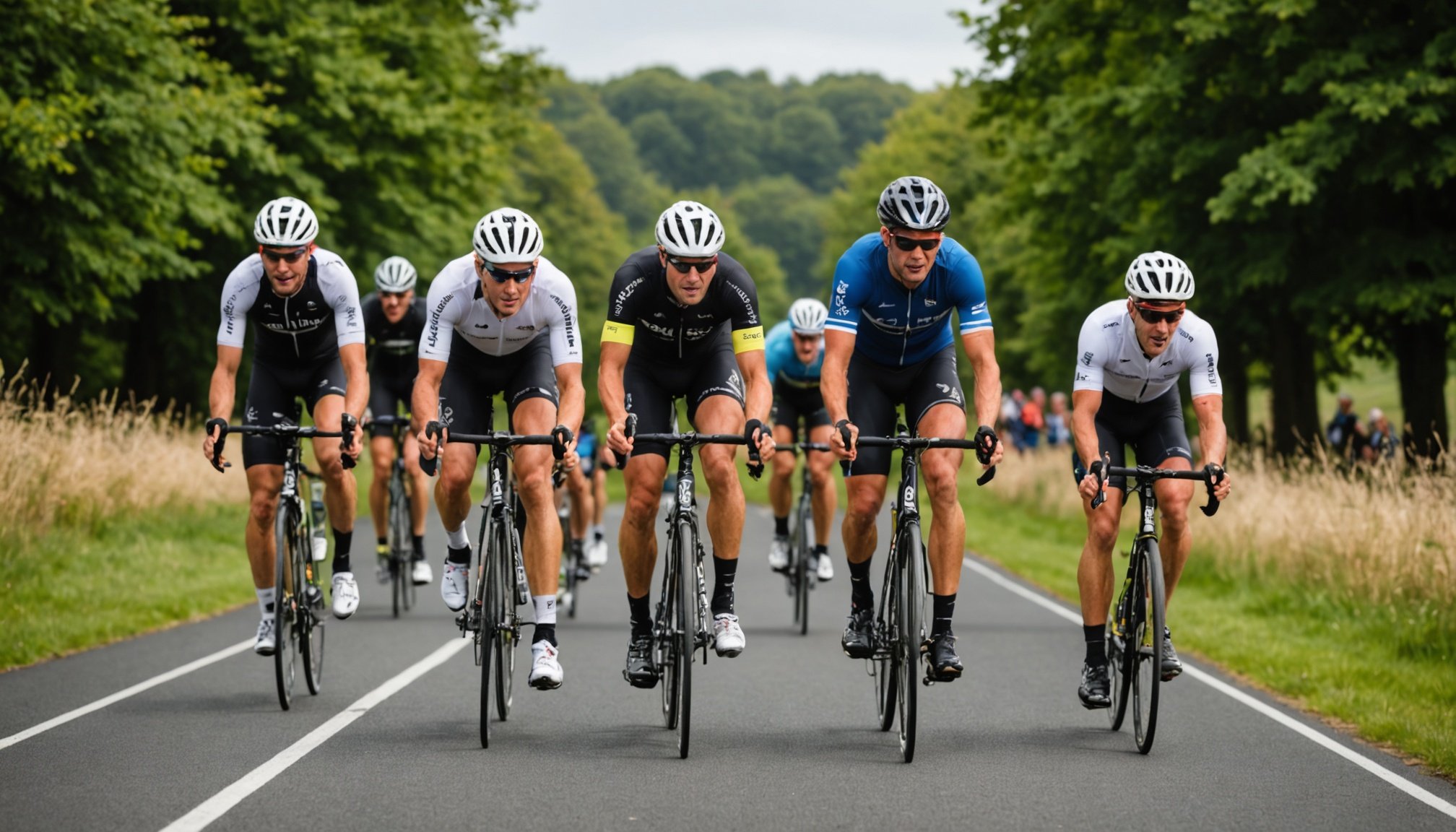Understanding the Unique Needs of Triathletes in the UK
Training as a triathlete in the UK requires a comprehensive understanding of both the physical demands and environmental challenges specific to the region. The UK triathlon challenges are unique due to its variable climate and geographical diversity. This inevitably influences triathlete training needs.
Regrettably, the UK weather, ranging from rainy spells to unpredictable temperature shifts, demands triathletes adapt their training. These conditions necessitate flexibility in training routines, often requiring indoor alternatives. Ensuring resilience, athletes regularly transition between outdoor and indoor settings, which, in turn, influences their stamina and adaptability.
Also to read : The definitive playbook: winning tactics for uk sports clubs to boost sponsorship success
Athlete requirements in the UK also extend to developing certain physical and mental attributes. Given the rigorous nature of triathlon sports, UK triathletes must build a robust physique capable of withstanding mixed weather. Mentally, the ability to persevere through challenging and monotonous climates boosts endurance and focus.
Moreover, understanding the regional environmental factors is paramount for triathletes. Training close to home offers geographical familiarity, allowing athletes to become accustomed to local conditions.
In summary, the triathlon landscape in the UK demands strategic planning, mental fortitude, and adaptability to not only meet the athlete requirements effectively but also excel in competitive realms.
Key Components of a Training Program
Understanding and implementing the right effective training components is crucial for triathletes aiming for peak performance. A triathlon program structure typically relies on training essentials like focused periodization, balanced nutrition, and proper recovery strategies.
Periodization Strategies
Periodization refers to the systematic planning of athletic training, aimed at reaching the best performance levels. This method is vital for triathletes, especially in managing the UK’s varied race schedules. Planning training sessions seasonally helps athletes prepare for events optimally. Athletes adapt their training cycles to match specific events, ensuring they peak at the right time.
Nutrition for Triathletes
Sustained energy levels are fundamental, demanding a focus on key nutritional needs. Balancing macronutrients is essential. Dietary plans should be carefully crafted for pre-race, during the event, and post-race requirements. Notably, hydration strategies must be adjusted for the UK’s unpredictable climate, ensuring triathletes remain well-hydrated under any weather conditions.
Recovery Strategies
Recognising the importance of rest and recovery can significantly enhance a triathlete’s performance. Physical techniques like massage and stretching, combined with psychological recovery methods, aid in maintaining optimum levels. These methods not only prevent injuries but also promote overall well-being, preparing athletes for the rigours of triathlon events.
Skill Training for Swimming, Cycling, and Running
In the diverse world of triathlon, triathlon skill training becomes an essential focus for UK athletes. With the ever-changing climate conditions, specific swimming techniques and running efficiency methods are crucial to success.
Swimming Techniques
For UK triathletes, key swimming skills such as breathing control, stroke mechanics, and navigation are vital. The blend of indoor and outdoor swimming options demands adaptability. Indoor swimming provides a controlled setting to perfect techniques irrespective of weather, while outdoor swimming builds endurance against elements. Recommended drills involve interval training and the use of swim aids to enhance effectiveness.
Cycling Strategies
Cycling techniques in the UK focus heavily on efficiency and terrain adaptation. Local routes often vary, requiring cyclists to practice ascents, descents, and cornering. Group training can offer, beyond camaraderie, a chance to refine drafting tactics. Essential cycling equipment like weather-appropriate gear ensures safety and comfort across mixed terrains.
Running Efficiency
Improving running economy involves mastering cadence, posture, and pacing. Training on different surfaces—trail, road, or track—each offers unique benefits in the UK context. Injury prevention remains key, with recovery protocols like proper nutrition and joint exercises underpinning sustainable training programmes. Practising these strategies comprehensively elevates an athlete’s competitive edge.
Equipment Recommendations
Triathletes in the UK face a special set of challenges that demand a comprehensive triathlon gear ensemble, tailored for UK conditions. Essential equipment varies according to the discipline—swimming, cycling, and running.
Triathlon Discipline Gear
-
Swimming: Wetsuits are crucial for colder UK waters, providing insulation and buoyancy. High-quality goggles ensure clear vision in both indoor pools and open water.
-
Cycling: Bikes designed for endurance, featuring adaptable gears for hilly terrains, are essential. Waterproof gear, including shoes and jackets, safeguards against the UK’s unpredictable weather.
-
Running: Durable shoes with excellent traction are vital for navigating diverse surfaces. Reflective clothing enhances visibility during early morning or evening runs, especially under gloomy skies.
Gear Considerations and Maintenance
Selecting gear suited for variable UK weather entails understanding specific needs for each season. Proper maintenance, like regular bike checks and shoe rotation, extends the lifespan of equipment. To ensure longevity, upgrading gear periodically remains advisable, particularly for competitive athletes aiming for peak performance. Prioritizing essential equipment tailored to environmental conditions enhances training and, ultimately, race-day readiness.
Leveraging Local Training Environments
Triathletes in the UK can significantly enhance their performance by making the most of local training locations. These sites offer unique opportunities to acclimatise to regional weather and terrain, vital for competitive success.
UK training locations such as the Lake District or Scottish Highlands provide varied landscapes for developing different triathlon skills. These environments enable athletes to train in elements similar to those encountered in competitive events.
Adapting to local weather encourages triathletes to be versatile. Frequent changes in climate necessitate flexibility in schedules and a mix of indoor and outdoor training. By embracing these conditions, athletes build resilience and improved endurance.
Local triathlon clubs and communities play a crucial role, providing vital training resources. Engaging with these groups offers structured sessions, expert advice, and shared experiences, enhancing motivation and social connection.
Benefiting from environmental adaptations, athletes learn to strategize according to local challenges. This approach enables them to maximize training effectiveness, tailoring workouts to personal goals and regional conditions. By utilizing the wealth of resources available, UK triathletes can better equip themselves for the demands of their sport.
Resources for Coaches and Athletes
Navigating the dynamic world of triathlon requires robust coaching resources and ample athlete support. For a more fruitful journey, understanding available training tools is vital.
Coaching Strategies
To enhance athlete-coach communication, establishing clear objectives and regular feedback loops is essential. Reliable data analytics and technology, including training apps, offer insights into performance trends and help tailor sessions effectively. Pursuing recognised certifications and programs ensures coaches can provide the latest and most effective techniques.
Support Networks for Athletes
Building strong support systems is crucial. Local clubs deliver camaraderie and shared experiences, fostering a supportive community spirit. Engaging in networking opportunities with fellow triathletes opens avenues for personal growth and motivational boosts. Additionally, online forums offer a platform for exchanging advice and stories, connecting athletes worldwide.
Specific UK Races and Events
Familiarity with notable UK triathlons prepares athletes for diverse challenges. Understanding event logistics, such as registration and travel arrangements, reduces race-day stress. Tailored preparation strategies, focusing on unique layouts and environmental conditions of local events, enhance competitiveness. These insights equip athletes with the knowledge needed to excel in varying UK race scenarios.











